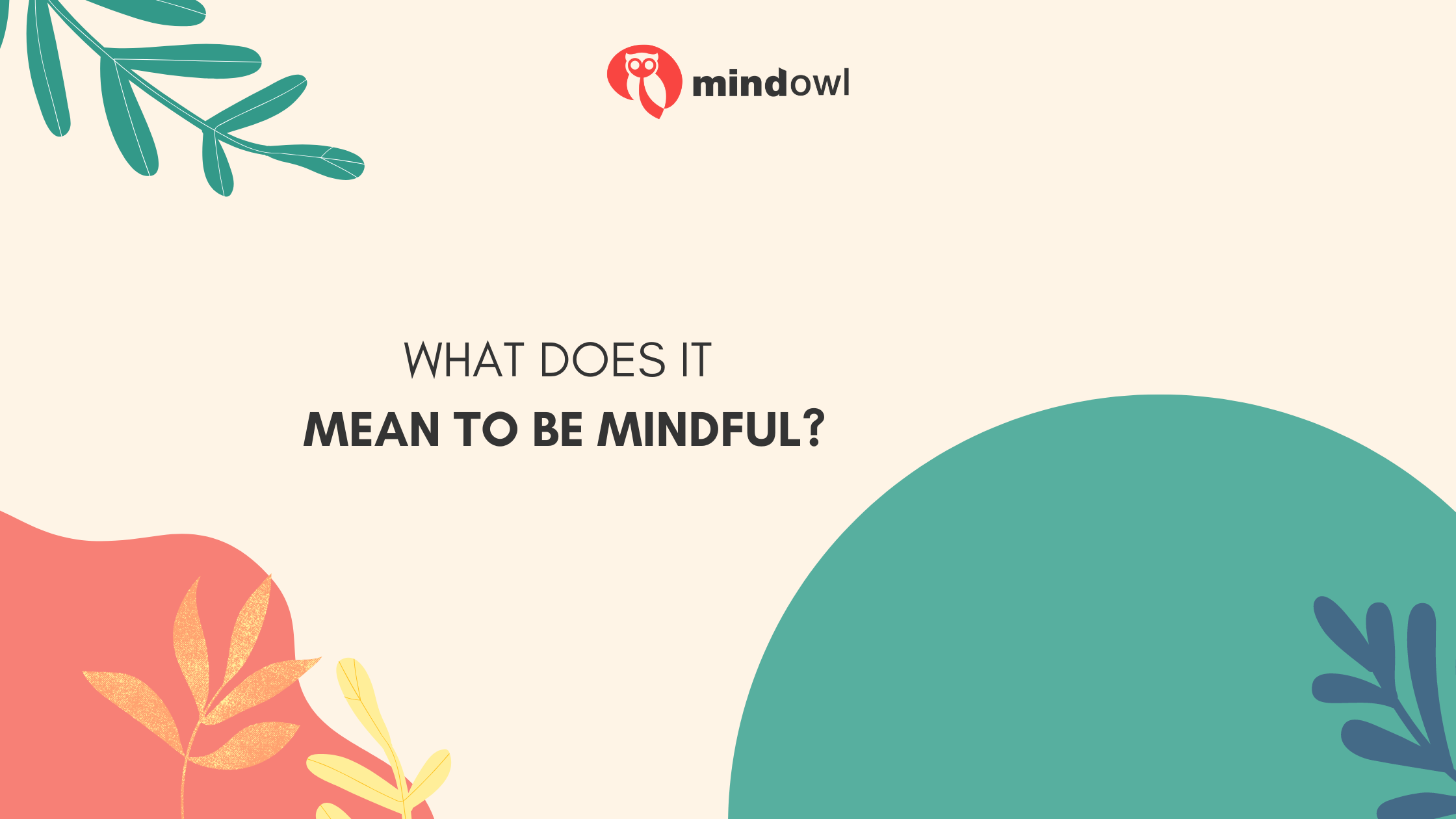In a world brimming with distractions and constant demands on our attention, the concept of mindfulness has surged in popularity, becoming a buzzword often touted as a panacea for modern life’s ills. But what does it mean to be mindful?
As we peel back the layers of this ancient practice, we uncover a wealth of depth often obscured by modern myths and misconceptions. This blog aims to demystify mindfulness, exploring its true essence beyond the serene images and popular catchphrases.
Join us as we delve into the heart of mindfulness, examining how this powerful practice can reshape our minds, and enrich our lives, and why it’s about so much more than just taking a deep breath and enjoying the moment.
Key Takeaways
- Mindfulness is about paying attention to the present moment without judging our thoughts, feelings or sensations.
- There are different mindfulness practices such as seated meditation, walking meditation and mindful breathing that can help improve mental health and reduce stress.
- Incorporating mindfulness into daily activities like eating and walking can create a sense of calm throughout the day.
- It’s not about being perfect; it allows us to accept imperfections and understand ourselves better which helps in managing emotions.
- To benefit from mindfulness, practice consistently with techniques like meditation or integrating it into everyday tasks.

What is Mindfulness?
Mindfulness is the practice of bringing attention to the present moment without judgment. It involves being fully present and aware of one’s thoughts, feelings, bodily sensations, and everything going on around them.
The Definition of Mindfulness
Mindfulness means paying full attention to what’s happening right now. It involves being aware of your thoughts, feelings, and sensations without judging them. You might notice the sound of traffic outside or feel the chair you’re sitting on.
Mindfulness is a natural part of being human that helps us connect to the present moment.
This practice doesn’t ask you to change who you are. Instead, it builds on your ability to be fully present and aware of where we are and what we’re doing. Simple activities like mindful breathing or eating can deepen this awareness.
Becoming more attentive brings many benefits for overall well-being and mental health.
The Types of Mindfulness Practice
Understanding mindfulness helps us see the different ways we can practice it. There are several types to explore, each with unique benefits.
- Seated Meditation: Sit quietly and focus on your breath. This is a classic form of mindfulness where you can really tune into your body and thoughts.
- Walking Meditation: Walk slowly and pay attention to each step you take. Feel your feet touching the ground and let this rhythm help you stay present.
- Standing Meditation: Stand still and notice your body’s weight on the floor. It’s a simple yet powerful way to connect with the moment.
- Moving Meditation: Combine mindfulness with movements like yoga or tai chi. These activities help link breath with motion for full-body awareness.
- Mindful Breathing: Concentrate on your inhalations and exhalations. This exercise brings you back to the present whenever your mind wanders off.
- Body Scan: Lie down and mentally scan through each part of your body. It encourages awareness of physical sensations and promotes relaxation.
- The Raisin Exercise: Take a raisin and use all your senses to explore it before eating. Notice its texture, scent, and taste fully as you eat slowly.
- Loving-kindness Meditation: Send positive wishes to yourself and others. This type of meditation fosters compassion and empathy towards everyone, including yourself.
The Benefits of Mindfulness
Practising mindfulness can lead to improved mental health, increased self-awareness, and reduced stress and anxiety. It has been shown to have a positive impact on overall well-being and can help individuals manage their emotions more effectively.
Improved mental health
Mindfulness meditation brings many mental health benefits. It helps people feel more positive and less stressed. These changes can lead to better sleep and a stronger immune system.
With regular mindfulness practice, your brain may start to handle emotions differently, helping with problems like depression.
Being mindful means paying close attention to how you feel without judgment. This awareness can change the way you think about life’s challenges. Over time, your mind becomes calmer and clearer.
You might find it easier to enjoy the present moment instead of worrying about the past or future.
Increased self-awareness
Increased self-awareness comes with practicing mindfulness. You become more aware of your thoughts and feelings. This can help you understand why you feel certain ways. It might show you how some thoughts are not helpful.
Awareness of one’s body and mind grows as well. You notice the small things that happen around you. These might be sounds, smells, or how food tastes. Mindful eating is an example of this awareness.
Knowing yourself better may also improve relationships with others. You listen better and become kinder to both yourself and those around you.
The next step involves looking at how stress and anxiety levels go down with mindfulness practice.
Reduced stress and anxiety
Gaining self-awareness through mindfulness can lead to a calmer mind. When you practice mindfulness, you focus on the present moment. This helps your brain stop worrying about the past or fearing the future.
Mindfulness exercises train your mind to stay calm and respond better to stress.
Mindfulness might be as helpful as medicine for feeling less anxious or depressed. By paying attention to your thoughts and feelings without judging them, you feel more at peace. Simple actions like breathing deeply help release tension in your body.
Practising these skills every day can make big changes in how stressed or worried you feel.
What Being Mindful Really Means
Being mindful means cultivating non-judgmental awareness, living in the present moment, and practicing compassion towards oneself and others. It involves noticing thoughts, feelings, and sensations without getting caught up in them or reacting impulsively.
Non-judgmental awareness
Non-judgmental awareness is a key part of mindfulness. It means noticing your thoughts and feelings without deciding if they are good or bad. You observe whatever you’re experiencing, just as it is.
This can be tough because we often judge ourselves and our experiences.
Practising non-judgmental awareness helps us see things more clearly. We learn to accept moments without rushing to change them. This teaches us to be kinder to ourselves and understand our true emotions better.
Mindfulness lets us know exactly what’s going on in our minds right now, without any filters or criticism.
Living in the present moment
Living in the present moment means being fully aware of your here and now. You notice everything around you—the sights, sounds, and feelings—without getting lost in thoughts about the past or future.
This helps cut down on stress because you’re not worrying about what’s already happened or what might happen next. Mindfulness is all about this kind of attention.
You pay close attention to whatever you’re doing at the moment. If you’re eating, taste each bite; if you’re walking, feel your feet touch the ground. This doesn’t mean pushing away thoughts but noticing them without judgment and bringing your focus back to where you are.
It can make everyday life richer and more meaningful as it pulls us out from under our pile of worries and lets us enjoy life as it unfolds right before us.
Cultivating compassion
Living in the present moment allows us to develop a heightened awareness of our own experiences and emotions. Cultivating compassion goes hand in hand with this practice, as it involves extending that same awareness and understanding to others.
Research shows that mindfulness practice can increase empathy and compassion towards both ourselves and those around us. By being mindful, we create space to recognise when others are suffering or in need, which enables us to respond with kindness and understanding.
Cultivating compassion also has positive effects on our mental health. Studies have revealed that engaging in compassionate acts activates the brain’s reward centres, triggering feelings of happiness and fulfilment.

What Being Mindful is Not
Being mindful is not about being perfect or avoiding negative thoughts, it’s about cultivating awareness and compassion in the present moment. To learn more about what it means to be mindful, keep reading for practical examples and tips on how to incorporate mindfulness into your daily life.
Being perfect
Perfection is not the goal of mindfulness. It’s about developing non-judgmental awareness, allowing us to embrace our imperfections and accept ourselves as we are. Mindfulness teaches us to let go of the pressure to be flawless and instead focus on being present in each moment.
Embracing mindfulness means acknowledging that imperfection is part of being human. This understanding allows us to cultivate compassion for ourselves and others, fostering a sense of connection and empathy.
Rather than striving for perfection, mindfulness encourages a gentle acceptance of ourselves just as we are, flaws and all.
Avoiding negative thoughts
To avoid negative thoughts, practicing mindfulness can help by allowing us to be fully present and aware of our surroundings. Cultivating mindfulness does not require us to change who we are but can help us avoid being overly reactive or overwhelmed by negative thoughts.
Scientifically demonstrated benefits of mindfulness practices include reducing negative thoughts and improving overall well-being. Daily mindfulness practices can help us become more aware of our thoughts and feelings without becoming overly reactive or overwhelmed by negative emotions, promoting a healthier mindset and emotional balance through increased self-awareness and non-judgmental awareness.
By integrating mindful practices into our daily lives, we gain the ability to acknowledge negative thoughts without letting them consume our mental space, empowering us with the tools needed to navigate through challenges with a clearer perspective.
A cure-all solution
– A cure-all solution is not what mindfulness offers. It’s essential to understand that mindfulness is not a quick fix for mental health issues, and it may not work for everyone. While it brings a range of benefits such as improved mental health, increased self-awareness, and reduced stress and anxiety, it’s crucial to recognise that mindfulness is a practice that requires consistency and dedication.
Rather than being a one-size-fits-all solution, mindfulness serves as a tool to support individuals in cultivating a deeper understanding of their thoughts, emotions, and overall well-being.
By acknowledging the limitations of mindfulness as a universal remedy, individuals can approach the practice with realistic expectations while harnessing its potential to enhance their mental and emotional resilience.
How to Practice Mindfulness
To practice mindfulness, you can start by incorporating meditation into your daily routine, finding a qualified teacher to guide you, and staying consistent in your practice. Mindfulness can also be integrated into everyday activities such as eating, walking, or even washing dishes.
Meditation practice
Meditation begins in the body, focusing on where you are and what’s happening. It’s part of mindfulness training.
- Seated meditation involves finding a quiet, comfortable spot and paying attention to your breath or bodily sensations.
- Walking meditation means being mindful while walking, noticing each step and the sensations in your body.
- Standing meditation is about being still and present, feeling the connection between your feet and the ground.
- Moving meditation includes activities like yoga or sports, where you bring mindfulness into physical movement or exercise.
Incorporating mindfulness into daily life
After establishing a regular meditation practice, individuals can begin incorporating mindfulness into their daily lives through the following techniques and practices:
- Engage in mindful breathing exercises throughout the day to bring attention back to the present moment and cultivate a sense of calm amidst daily activities.
- Practise mindful eating by slowing down and savouring each bite, paying attention to flavours, textures, and the experience of nourishing the body.
- Take short mindful pauses during work or other activities to check in with thoughts, emotions, and physical sensations, promoting self-awareness and reducing stress.
- Integrate mindfulness into routine tasks such as washing up or walking by focusing on the sensory experiences associated with these activities.
- Cultivate gratitude by taking a few moments each day to reflect on and appreciate positive aspects of life, fostering a more positive mindset.
- Use mindful communication by consciously listening when interacting with others, allowing for deeper connections and understanding in conversations.
- Apply mindfulness to challenging situations by acknowledging emotions without judgement and responding thoughtfully rather than reactively.
- Incorporate mindfulness into movement-based practices such as yoga or tai chi, emphasising presence and awareness during physical activity.

Finding a qualified teacher
To find a qualified teacher for mindfulness practice, seek reputable programmes like Jon Kabat-Zinn’s Mindfulness-Based Stress Reduction Programme (MBSR) or Mindfulness-Based Cognitive Therapy (MBCT).
Look for instructors with experience in these evidence-based approaches who can guide you through formal meditation and applying mindfulness techniques to daily life. Research their background and credentials to ensure they align with established mindfulness principles, enhancing your understanding of mindfulness practices.
Embrace teachers who encourage non-judgemental awareness and compassion while guiding you towards improved mental health and reduced stress. By choosing the right instructor, you set yourself on a path to deepen your mindfulness journey.
Consider attending workshops led by accredited practitioners knowledgeable about MBSR or MBCT, ensuring that the teacher embodies the essence of living mindfully without imposing personal beliefs.
Seek guidance from experts capable of cultivating self-awareness and steering you away from misconceptions about being mindful. Choose teachers committed to creating a supportive environment for your growth rather than promoting perfectionism or providing quick-fix solutions to life’s challenges.
Staying consistent
Consistent mindfulness practice is crucial for experiencing the full benefits of improved mental health, increased self-awareness, and reduced stress. It’s important to establish a regular routine that you can stick to, whether it’s daily meditation or incorporating mindfulness into your everyday activities.
By staying consistent with mindfulness practices, you can cultivate a greater sense of awareness without being overwhelmed by reactive responses. This consistency can lead to more effective and resilient ways of dealing with challenges in various aspects of life.
Through maintaining a regular schedule of mindfulness practice, you’ll be able to navigate life with enhanced clarity and composure, addressing issues with an informed and calm mindset.
Conclusion
In conclusion, being mindful means staying fully present and aware of our surroundings. It involves cultivating qualities like non-judgmental awareness, living in the moment, and showing compassion to ourselves and others.
Mindfulness can be accessed through meditation practice and has proven benefits for mental health, work performance, and relationships. By practicing mindfulness in everyday life, we can reduce stress, enhance well-being, and deepen our connection with the world around us.
FAQs
1. What is being mindful?
Being mindful means paying attention to what’s happening right now with awareness of one’s thoughts and feelings, without letting your mind wander to the past or future.
2. Why should I practice mindfulness throughout my day?
Practicing mindfulness throughout your day can help you become more aware of how you’re feeling and what’s going on around you, which may improve focus and well-being.
3. Can meditation help me be more mindful?
Yes, meditation techniques like focusing on your breath can strengthen mindfulness by training your brain to bring its attention back to the present moment when it wanders.
4. Does being mindful affect the brain?
Mindfulness has been shown to change thought patterns in a positive way, even increasing gray matter in parts of the brain linked with self-awareness and emotional regulation.
5. How can mindfulness improve work or school experiences?
Mindfulness helps individuals pay closer attention and work more efficiently, making collaboration at work or participation in mindful schools especially impactful for high-impact tasks.
6. Are there tools that support practicing mindfulness?
Yes, there are free online resources that provide guidance on mindfulness practices; also apps like Asana can keep everyone informed about tasks and projects without losing touch with the present.
MindOwl Founder – My own struggles in life have led me to this path of understanding the human condition. I graduated with a bachelor’s degree in philosophy before completing a master’s degree in psychology at Regent’s University London. I then completed a postgraduate diploma in philosophical counselling before being trained in ACT (Acceptance and commitment therapy).
I’ve spent the last eight years studying the encounter of meditative practices with modern psychology.

